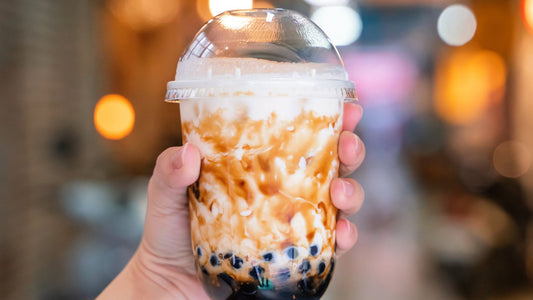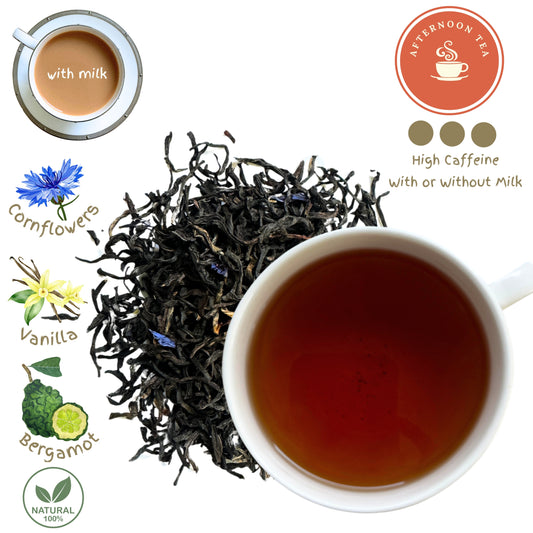What tea is considered ‘Best Ceylon Tea’?
“Best Ceylon Tea” refers to premium-quality tea produced in Sri Lanka, formerly known as Ceylon. It encompasses teas meticulously handpicked, processed with care, and sourced from renowned tea estates and gardens across the island. Best Ceylon Tea embodies exceptional flavor, aroma, and freshness, reflecting the rich heritage and expertise of Sri Lanka’s tea industry.
Ceylon tea, hailing from the verdant hills of Sri Lanka, is renowned worldwide for its exceptional quality, distinctive flavor, and rich heritage. Widely considered as one of the finest teas in the world, Ceylon tea has a long and storied history dating back centuries.
The unique terroir of Sri Lanka, with its fertile soil, optimal altitude, and favorable climate, provides the perfect conditions for cultivating tea. The island’s tea-growing regions, including Nuwara Eliya, Dimbula, Uva, and Kandy, each offer distinct characteristics, resulting in diverse flavors and aromas.
Determining the “best” type of Ceylon tea is subjective and depends on individual preferences, as well as the occasion and desired flavor profile. Sri Lanka produces a wide range of Ceylon teas, each with its own unique characteristics.
Here are some popular types of Ceylon tea:
- Ceylon Black Tea:
This is the most common type of Ceylon tea and is known for its bold flavor and briskness. It can range from lighter and more delicate to rich and full-bodied, depending on factors such as the region it’s grown in and the processing method.
- Ceylon Green Tea:
Green tea from Sri Lanka offers a lighter flavor profile compared to black tea, with grassy and vegetal notes. It undergoes minimal oxidation during processing, preserving its green color and fresh taste. Ceylon green tea is prized for its antioxidant properties and health benefits.
- Ceylon White Tea:
White tea is the least processed type of tea, made from the youngest leaves and buds of the tea plant. Ceylon white tea is delicate and subtle, with floral and sweet notes. It is revered for its gentle flavor and high levels of antioxidants.
- Ceylon Oolong Tea:
Oolong tea from Sri Lanka offers a unique combination of characteristics between green and black tea. It undergoes partial oxidation, resulting in a complex flavor profile that can range from floral and fruity to toasty and creamy.
- Ceylon Flavored Teas:
Sri Lanka produces a variety of flavored teas, where Ceylon tea leaves are infused with natural flavors such as fruits, flowers, or spices. Popular flavored Ceylon teas include Earl Grey (bergamot-flavored), Jasmine, and various fruit-infused blends.
Ultimately, the best type of Ceylon tea is the one that suits your taste preferences and the occasion. Whether you prefer the robustness of black tea, the freshness of green tea, or the delicacy of white tea, there’s a Ceylon tea to satisfy every palate. Exploring different varieties and experimenting with brewing methods can help you discover your favorite type of Ceylon tea.
What does Ceylon Tea taste like?
Ceylon tea is known for its brisk and lively flavor profile. It has a bright, coppery infusion and a refreshing, lingering finish. The tea from Sri Lanka can range from delicate and floral to robust and full-bodied, catering to various palates. Whether enjoyed plain tea or with a splash of milk and a hint of sugar, Ceylon tea offers an invigorating and comforting drinking experience.
Ceylon Black Tea: Bold flavor.
Ceylon Green Tea: Lighter flavor profile with grassy and vegetal notes.
Ceylon White Tea: Delicate and subtle, with floral and sweet notes.
Ceylon Oolong Tea: Floral and fruity to toasty and creamy.
Ceylon Flavored Teas: Earl Grey (bergamot-flavored), Jasmine, Ceylon Cinnamon and various fruit-infused blends.
Why is Ceylon tea considered to be the best in the world?
Ceylon tea is esteemed globally for several reasons. Firstly, Sri Lanka’s unique terroir, characterized by high altitudes, fertile soil, and favorable climate, creates optimal conditions for tea cultivation. Secondly, the island’s tea industry boasts a legacy of innovation and excellence, with strict quality control measures ensuring that only the finest teas reach the market. Additionally, Ceylon tea’s versatility, with offerings ranging from delicate white teas to robust black teas, appeals to a broad spectrum of tea enthusiasts, further enhancing its reputation as the best in the world.
One of the key factors contributing to the exceptional quality of Ceylon tea is the meticulous handpicking of the tea leaves. Skilled tea pluckers carefully select only the youngest and tenderest leaves, ensuring that each batch of tea is of the highest quality. These leaves are then processed using traditional methods, which may include withering, rolling, oxidation, and drying, depending on the desired type of tea.
What is the best grade of Ceylon tea?
The best grade of Ceylon tea is often considered “Orange Pekoe” (OP), which refers to whole, unbroken tea leaves. Within the OP category, teas are further classified based on leaf size and quality, with grades such as “Flowery Orange Pekoe” (FOP) and “Golden Flowery Orange Pekoe” (GFOP) denoting superior leaves with golden tips, prized for their rich flavor and aroma.
Can I drink Ceylon tea every day?
Yes, Ceylon tea can be enjoyed daily. Make fine Ceylon tea as part of a balanced diet and healthy lifestyle. The tea from Sri Lanka contains antioxidants and other beneficial compounds that may promote overall well-being helping you to enhance your wellness. Moderation is vital, as excessive consumption of caffeine-rich beverages like Ceylon tea may lead to adverse effects like as insomnia or increased heart rate.
How does a cup of Ceylon Tea compare with a cup of Coffee?
The caffeine content in Ceylon tea can vary. It depends on factors such as the type of tea (e.g., black, green, white), the specific variety, and how it’s brewed. On average, a cup of brewed Ceylon black tea typically contains around 40-70 milligrams of caffeine per 8-ounce serving. This can vary depending on factors such as brewing time and water temperature.
Comparatively, a cup of coffee tends to have a higher caffeine content. An 8-ounce cup of coffee may contains approximately 95 milligrams of caffeine, though this can also vary depending on the type of coffee bean, the brewing method, and the coffee-to-water ratio.
Therefore, while Ceylon tea contains caffeine, it generally contains less caffeine than coffee. This makes it a suitable option for those looking for a moderate caffeine boost without the higher caffeine content typically found in coffee.
What is premium Ceylon tea?
Premium Ceylon tea refers to top-quality teas sourced from select estates and gardens known for their exceptional standards of cultivation and processing. These teas are characterized by their superior flavor, aroma, and appearance, making them highly sought after by discerning tea connoisseurs.
What is Ceylon tea called now?
While Ceylon was the former name of Sri Lanka, the tea produced in the country is still commonly referred to as Ceylon tea, owing to its historical significance and global recognition. However, in recent years, efforts have been made to promote the term “Sri Lankan tea” to reflect the country’s identity accurately.
When should I drink Ceylon tea?
Ceylon tea is versatile and can be enjoyed in various forms, including black, green, white, and oolong teas. Whether sipped hot or cold, as a soothing cup of afternoon tea or a refreshing iced beverage, Ceylon tea never fails to captivate the senses and uplift the spirit.
Ceylon tea can be enjoyed throughout the day. Still, it is particularly popular as a morning beverage due to its invigorating properties. It also makes for a delightful afternoon pick-me-up or a soothing evening drink. When to drink Ceylon tea ultimately depends on personal preference and lifestyle.
How do you drink Ceylon tea?
Ceylon tea can be prepared in various ways, including hot tea, iced tea, or even as part of tea-based cocktails. To prepare hot Ceylon tea, steep 1 teaspoon of loose tea leaves or 1 Ceylon tea bag in hot water for about 3-5 minutes, depending on desired strength. Serve plain or with milk and sugar to taste.
What are the health benefits of drinking the Best Ceylon Tea?
In addition to its exquisite taste, Ceylon tea is also prized for its health benefits. Rich in antioxidants, and other beneficial compounds, including polyphenols and catechins, Ceylon tea promotes heart health, boosts metabolism, and strengthens the immune system. It is also a natural source of caffeine, providing a subltle boost without the jitteriness often associated with coffee.
Is Ceylon tea anti-inflammatory?
Ceylon tea contains antioxidants, such as polyphenols, which may be anti-inflammatory. Regular consumption of Ceylon tea, as part of a your diet, may help reduce inflammation and promote overall health.
Does Ceylon tea reduce belly fat?
While Ceylon tea alone is not a magic solution for reducing belly fat, it can be part of a healthy lifestyle that includes a balanced diet and regular exercise. Some studies suggest that the antioxidants found in tea, including Ceylon tea, support weight loss efforts by boosting your metabolism and aiding in fat oxidation.
What is the most expensive tea in Sri Lanka?
The most expensive tea in Sri Lanka is often specialty teas produced in limited quantities, such as certain varieties of white tea or teas made from rare cultivars. These teas command high prices due to their unique flavor profiles, exquisite appearance, and scarcity.
What is pure Ceylon tea?
Pure Ceylon tea refers to tea that is made entirely from leaves grown and processed in Sri Lanka, without any additives or blending with teas from other regions. It is valued for its authenticity and the distinctive characteristics of Sri Lanka’s terroir. Pure Ceylon tea is renowned for its exceptional quality and is prized by tea enthusiasts.
For those seeking the best Ceylon tea, looking for teas sourced from reputable estates and gardens known for their commitment to quality and sustainability is recommended. By choosing premium Ceylon teas, connoisseurs can experience the true essence of this beloved beverage and embark on a journey of sensory delight unlike any other.
What is Single estate Ceylon Tea?
Single estate Ceylon tea refers to tea that is sourced from a single tea estate or plantation in Sri Lanka. Rather than being a blend of teas from various sources, single estate Ceylon tea is harvested, processed, and packaged exclusively from the leaves grown on a specific estate.
There are several benefits to consuming single estate Ceylon tea:
- Distinctive Flavor: Single estate teas often exhibit unique flavor profiles that are characteristic of the particular region and terroir where they are grown. Factors such as altitude, soil composition, climate, and processing methods can influence the taste, aroma, and appearance of the tea.
- Quality Assurance: Single estate teas typically undergo rigorous quality control, ensuring only the finest leaves are selected for processing. This attention to detail maintains quality consistency and ensures a superior product.
- Traceability and Transparency: Single estate teas offer traceability, allowing consumers to know exactly where their tea comes from. This transparency in sourcing provides assurance regarding the tea’s authenticity, freshness, and ethical production practices.
- Support for Small-Scale Producers: By purchasing single estate Ceylon tea, consumers directly support small-scale tea producers and their communities. This helps promote sustainable agriculture and contributes to the economic development of rural areas in Sri Lanka.
Overall, single estate Ceylon tea offers tea enthusiasts the opportunity to explore the diverse range of flavors and characteristics that Sri Lanka’s tea-growing regions have to offer. It allows for a deeper appreciation of the craftsmanship and heritage behind each cup of tea, making it a truly special and rewarding choice for tea connoisseurs.










